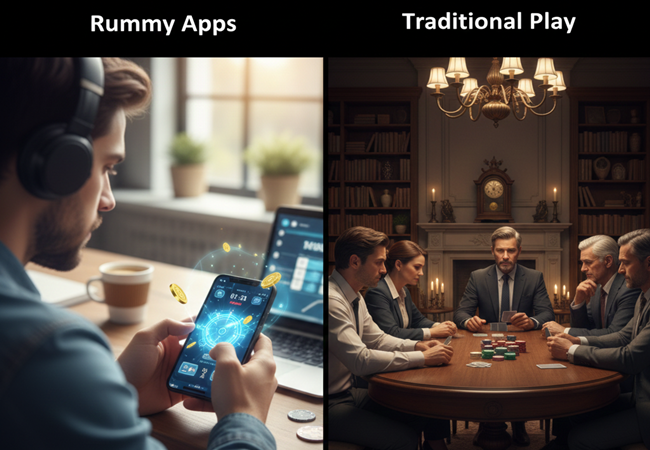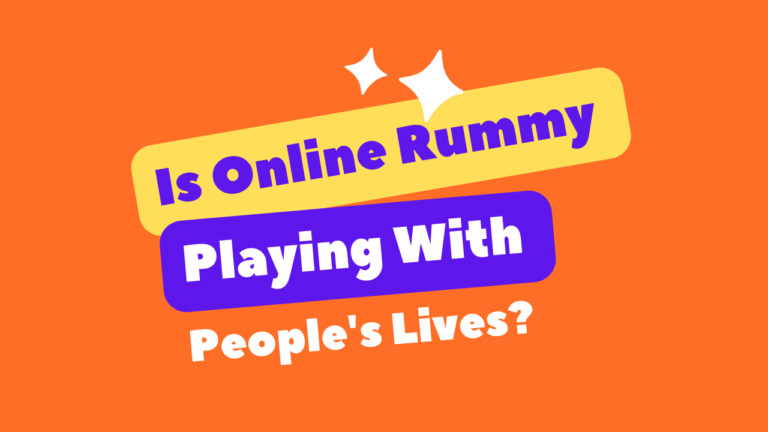Rummy Apps vs. Traditional Play: Which is Better
Rummy is timeless: a simple deck, clever melding, and the satisfying click of cards as hands unfold. But the way we play has split into two camps — the tactile, face-to-face experience of traditional play and the fast-evolving world of Rummy apps. Each offers strengths and trade-offs. This article breaks down the differences across convenience, social connection, skill development, fairness, cost, and enjoyment to help you decide which format suits you best.

Accessibility & Convenience
Rummy Apps: The biggest draw is convenience. Apps let you play anytime, anywhere — on your commute, during a lunch break, or at midnight when friends aren’t available. Matchmaking systems quickly pair you with opponents across skill levels; tournaments and cash tables run around the clock. Many apps like Teen Patti Stars also save game history, statistics, and allow practice modes against bots so you can play at your own pace.
Traditional Play: In-person games require coordination: finding players, agreeing on rules, and sometimes traveling to someone’s home or a club. But that setup brings rituals many players cherish—shuffling cards, dealing by hand, and reading physical tells. If you value the ritual and tactile pleasure, nothing digital quite replaces it.
Social Experience & Atmosphere
Rummy Apps: Online play offers new forms of social interaction — chat boxes, emojis, leaderboards, and community forums. For many, being part of a large global community is a plus. However, app interactions are often brief and superficial. The social warmth of laughter, banter, and shared snacks is harder to replicate through a screen.
Traditional Play: The social element is where physical play shines. Friends, family gatherings, and club nights create memories and forge connections. You pick up subtle cues, enjoy friendly trash talk, and build relationships over repeated sessions — something an app’s interface can’t fully emulate.
Skill, Strategy & Learning Curve
Rummy Apps: Most apps cater to different skill levels and often provide analytics — your win rate, common mistakes, and helpful tips. Playing many quick hands against varied opponents accelerates learning. That said, fast play and aggressive matchmaking can encourage impulsive strategies rather than thoughtful planning.
Traditional Play: Live games often promote deeper, slower thinking. Players tend to focus more on long-term table dynamics, psychological reads, and etiquette-driven strategies. If you want to refine classic skills like deceit, observation, and patience, face-to-face play fosters that environment.
Fairness, Security & Integrity
Rummy Apps: Reputable apps use random number generators (RNGs) and anti-fraud measures; they can be audited and updated to prevent collusion or cheating. But the online environment also attracts players using bots, multi-accounting, or collusion when safeguards are weak. Choosing licensed, well-reviewed apps is crucial for secure play.
Traditional Play: Cheating is harder to mask in person but not impossible. Experienced players can spot irregularities faster when they’re physically present. Clubs and trusted friend groups usually self-regulate, creating a fairly secure environment — but trust is always a key factor.
Cost & Economic Considerations
Rummy Apps: Apps range from free-to-play to pay-to-enter cash tables. Transaction fees, withdrawal conditions, and promotional offers all influence the real cost. While apps can be more economical (no travel, lower buy-ins), microtransactions and in-app purchases can add up if you’re not careful.
Traditional Play: Cash games at home mean splitting costs among players; at clubs there may be a rake or table charge. Drinks, snacks, or travel expenses can also make physical play pricier. However, the overall cost is often transparent and predictable.
Variety & Features
Rummy Apps: Digital platforms for games on mobile can offer many formats — classic rummy, pool rummy, points rummy, tournaments, leaderboards, tutorials, and themed events. Features like replays, hand history analysis, customizable interfaces, and matchmaking filters enhance replay value and personalization.
Traditional Play: Physical play is limited to the rules you and your group agree on, which can be a strength: simple, consistent games without distractions. Variants can be introduced, but they require everyone to learn and agree. For purists who want pure rummy without bells and whistles, this is ideal.
Pace & Time Commitment
Rummy Apps: Games tend to be faster. If you want short bursts of play — a 10-minute round between tasks — apps are perfect. This speed can be addictive and may encourage riskier plays.
Traditional Play: Sessions are usually longer and more deliberate. If you enjoy immersive nights that test endurance and long-term strategy, in-person play aligns better with that rhythm.

Physical & Mental Benefits
Rummy Apps: Digital play exercises pattern recognition and decision-making quickly but is sedentary and screen-based. Many apps include training modes that help cognitive skills, but the physical benefits are minimal.
Traditional Play: Handling cards, moving chips, and socializing provide tactile and sensory stimulation. The richer social environment can also support emotional well-being and stronger memory formation tied to social cues.
Which Is Better? Context Matters
There’s no universal answer — the “better” option depends on what you value:
- Choose rummy apps if you want convenience, rapid play, broader competition, analytics-driven improvement, and a low barrier to entry. Apps are ideal for busy players, those practicing strategy through volume, or people who enjoy competing globally and tracking stats.
- Choose traditional play if you prioritize social connection, tactile enjoyment, slower-paced strategy, and the shared rituals of face-to-face gaming. In-person games suit players who cherish relationship-building, table talk, and the timeless feel of shuffling paper cards.
Blending Both Worlds
Many serious players use a hybrid approach: practicing skills and logging many hands on apps, then bringing those improved game tactics to live games for the richer social experience. Clubs and friend groups increasingly use apps for scheduling, scoring, or training between meetups — a practical way to get the best of both experiences.
Final Thoughts
Rummy’s heart hasn’t changed: it’s still about reading the table, making choices, and savoring the win. Technology has given us options — not replacements. Rummy apps democratize access and speed up learning, while traditional play preserves the social and sensory rituals that make the game memorable. Try both. Use apps to sharpen your tactics and enjoy Rummy Games Online that fit into your day; keep the in-person sessions for deeper connection and the slow joy of a long, well-played evening. Ultimately, the best choice is the one that keeps you playing — and having fun.







